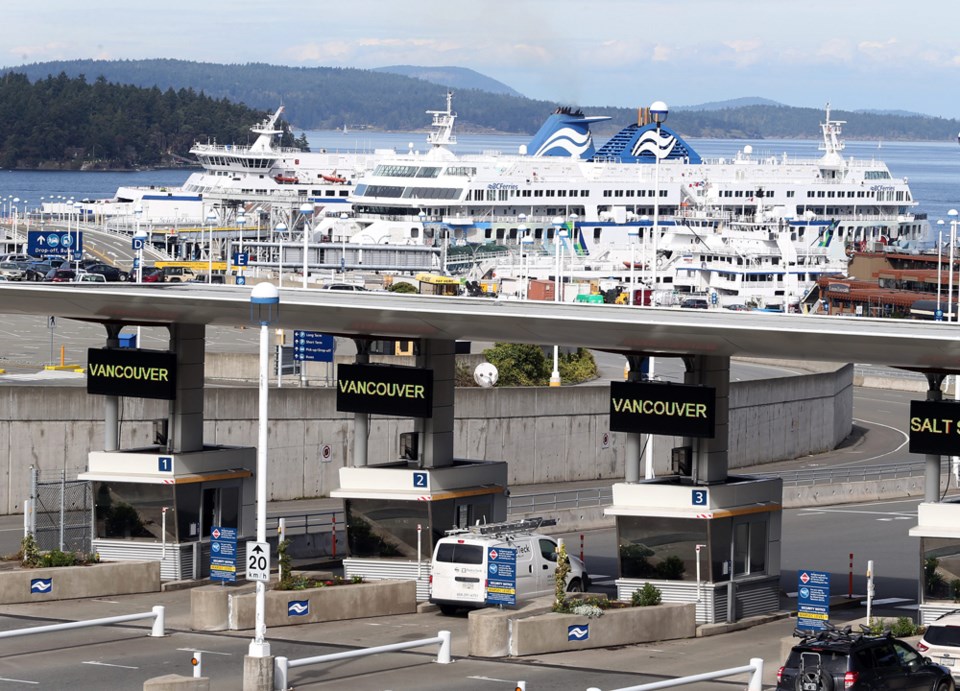The province is adding measures to the Coastal Ferry Act to ensure the public interest — not just financial considerations — is taken into account when decisions are made for the B.C. ferry system.
“British Columbians deserve a ferry-service model that puts people first,” Transportation Minister Claire Trevena said Wednesday.
“People living in coastal communities depend on the vital service provided by B.C. Ferries, but for many years they experienced service cuts and climbing fares. Our amendments to the Coastal Ferry Act will put people at the heart of decision making.”
Existing law requires B.C. Ferries’ independent commissioner to balance the interests of ferry users, taxpayers and financial sustainability.
Public interest will be built into decision making at various levels within B.C. Ferries under amendments to the act, Trevena said.
She pointed to the previous government’s decision to scrap the Port Hardy-Bella Coola route as an example of a lack of concern for the public interest.
“It was very clear that the public interest was not at the heart of any of that decision making,” Trevena said. “It was political decision making which hurt coastal communities. It hurt Indigenous communities. It hurt the tourism sector.”
After tourism operators complained of losing millions of dollars in revenue, B.C. Ferries bought a Greek ferry, now called the Northern Sea Wolf, to serve that route, but ship upgrades have dragged on and bills have mounted. Final costs are not known.
The Northern Sea Wolf was supposed to start running last summer, but that was delayed. The vessel, now undergoing upgrades at the Richmond refit facility, is expected to be in service on the Port Hardy-Bella Coola route in June.
The proposed Coastal Ferry Act amendments are based on recommendations from consultant Blair Redlin’s Coastal Ferry Services Review, released in February by the province.
The requirement to make public interest a priority when the B.C. Ferries commissioner makes decisions about ferry services includes taking B.C.’s greenhouse gas emission targets into consideration.
B.C. Ferries’ Spirit of Vancouver Island and Spirit of British Columbia have been converted to run on a dual-fuel system that is expected to reduce carbon-dioxide emissions by 12,500 tonnes annually. The vessels, which serve the busy Swartz Bay-Tsawwassen route, now operate on liquefied natural gas with diesel as an option, instead of solely on diesel fuel.
Spirit of Vancouver Island returned to B.C. Wednesday after making the 10,000-nautical-mile journey from a shipyard in Poland where it was converted. When the ferry left B.C. last fall, it used 996 tonnes of diesel fuel to reach Poland.
On the way home, it used 824 tonnes of diesel and 108 cubic metres of LNG. LNG was not available at the ferry’s two refuelling stops, in the Canary Islands and at the Panama Canal, a B.C. Ferries official said in a statement. Spirit of British Columbia was converted to the dual-fuel system a year earlier.
In other planned changes, the number of B.C. Ferry Authority directors appointed by government will rise to four, from two, and the definition of “executive” will be expanded to include vice-presidents, who will come under a cap on executive compensation.
Asked about ferries being built in B.C., Trevena noted that shipbuilding is not part of the Coastal Ferry Act. Discussions on the subject will continue with B.C. Ferries, she said.
The NDP has long argued that coastal communities were hurt by the previous Liberal government’s decision to curtail routes when B.C. Ferries was losing money several years ago. The corporation has since returned to profitability and Trevena last week restored those routes to full service. The NDP has also frozen ferry rates for two years, and brought back a discount for seniors.
However, Trevena stopped short of returning B.C. Ferries to direct government control, which would require the government to absorb the ferry corporation’s debts. Trevena instead reiterated that she considers ferries part of “our marine highway.”
The legislation also proposes to eliminate parts of the law that would allow the commissioner to consider alternative private operators instead of B.C. Ferries in some circumstances. Trevena said those clauses were never used.
“It was put in when the B.C. Liberals tried to remove ferries and tried to privatize them,” said Trevena. “But nobody ever bid on the routes. It’s been redundant.”
B.C. Ferries’ commissioner issued a preliminary decision Monday to allow B.C. Ferries to raise fares by a maximum of 2.3 per cent annually from April 1, 2020, to March 31, 2024.
Province acts to put people first in B.C. Ferries’ decision making



